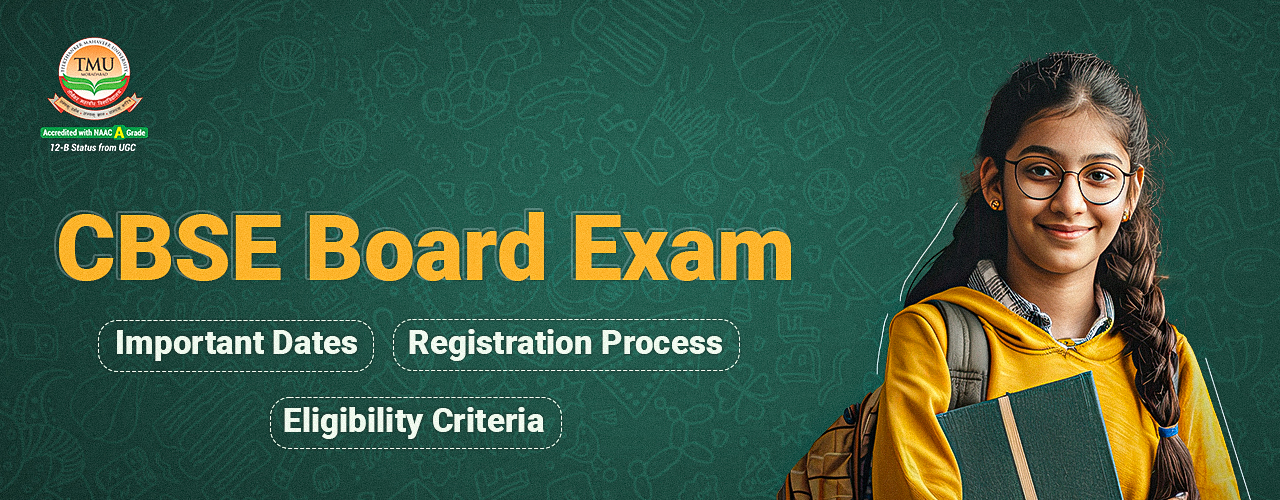CBSE Board Exam: Important Dates, Registration Process, and Eligibility Criteria
Table of Contents
CBSE or Central Board of Secondary Education plays an important role in overseeing the High School and Higher Secondary School board exams in India, setting high academic standards for millions of students.
As the exams comes closer, it is essential for students and parents alike to understand the key details such as important dates, registration processes, and eligibility criteria. This article provides a step-by-step guide, covering each aspect in depth to help you stay on top of the CBSE board exam essentials.
Full Form of CBSE
The full form of CBSE is Central Board of Secondary Education.
Introduction to CBSE
CBSE board exams, taken by millions of students across India, are essential in determining future academic paths. These exams cover grades 10 and 12, testing students on the entire syllabus learnt over the year.
CBSE was established in 1929 as a response to the growing demand for a standardised education system across India.
Initially, the board was formed to meet the educational needs of students whose parents had transferable jobs.
Over the years, it evolved into one of the most well-known education boards in the country, responsible for overseeing the curriculum and examinations for both private and public schools.
The focus of CBSE on continuous improvement, modern teaching methods, and inclusive education has made it a cornerstone of India’s academic structure.
Why Are CBSE Board Exams Important?
CBSE exams are critical as they assess student knowledge, preparing them for higher studies or entrance exams. A high CBSE score can open doors to reputable colleges and universities in India and abroad.
CBSE Exam Dates Overview
The CBSE exam dates are released on the official CBSE website. Typically, exams for grade 10 and 12 are held from February to April each year. Knowing the exam schedule helps students plan their studies, avoid last-minute stress, and be prepared for the exam season.
Detailed Exam Date Table
Below is a sample layout of CBSE board exam dates for the upcoming exams:
| Exam | Start Date | End Date | Subjects Covered |
| Grade 10 | February 15, 2024 | March 20, 2024 | English, Math, Science, Social Science |
| Grade 12 | February 15, 2024 | April 5, 2024 | Physics, Chemistry, Math, Biology, Economics, Business Studies, etc. |
Note: These dates are indicative; students should refer to the official CBSE website for the latest information.
CBSE Registration Process Overview
Registering for CBSE board exams is a straightforward yet vital step. The process involves an online application, submission of relevant documents, and paying a fee within the deadline.
Teerthanker Mahaveer University
Apply for Admission
Click Here To Apply for Admission
Step-by-Step Guide to CBSE Exam Registration
1. Online Registration Portal
- Visit the official CBSE website.
- Navigate to the “Student Registration” section.
2. Required Documents for Registration
- Passport-sized Photographs: Recent and clear photos.
- Identity Proof: Aadhaar card or school-issued ID.
- Previous Academic Certificates: Especially for grade 12 students.
- Date of Birth Certificate: As proof of age.
3. Application Fee Payment Process
- Fees are paid online via net banking, credit/debit card, or UPI.
- Upon successful payment, a confirmation receipt is generated, which should be kept for future reference.
Eligibility Criteria for CBSE Exams
Understanding the eligibility requirements ensures students are well-prepared. Let’s break down the main criteria.
1. Age Criteria
- Grade 10: Students should be at least 14 years of age.
- Grade 12: Students are typically 16-18 years old.
2. Academic Qualifications
- Students must have successfully completed grade 9 to enroll in the grade 10 exam.
- Grade 12 candidates should have passed grade 11.
3. School Affiliation Requirements
- Students must be enrolled in a CBSE-affiliated school to be eligible.
CBSE Board Class 12 Subjects
Class 12 is a pivotal year for students, as it defines their career and higher education pathways. CBSE offers a broad range of subjects in Class 12 to cater to various interests and career goals. These subjects are divided into three primary streams: Science, commerce, and Humanities (Arts). Students are generally required to choose subjects based on their future academic and career aspirations.
Here’s a detailed breakdown of the CBSE Class 12 subjects by stream:
| Stream | Core Subjects | Optional Subjects |
| Science | 1. Physics 2. Chemistry 3. Biology/Mathematics 4. English | 1. Computer Science 2. Physical Education 3. Biotechnology 4. Psychology 5. Informatics Practices |
| Commerce | 1. Business Studies 2. Accountancy 3. Economics 4. English | 1. Mathematics 2. Entrepreneurship 3. Physical Education 4. Applied Mathematics 5. Information Technology |
| Humanities (Arts) | 1. History 2. Political Science 3. Geography/Sociology 4. English | 1. Psychology 2. Economics 3. Physical Education 4. Fine Arts 5. Home Science 6. Media Studies 7. Fashion Studies |
1. Science Stream Subjects Overview
The Science stream is ideal for students interested in engineering, medicine, and technology. Core subjects like Physics, Chemistry, and Mathematics/Biology form the foundation. Students may also choose from options like Computer Science or Biotechnology based on their interests.
2. Commerce Stream Subjects Overview
Commerce is suited for those interested in fields like business, accounting, and economics. Core subjects include Business Studies, Accountancy, and Economics, and students often add Mathematics or Entrepreneurship to enhance their analytical skills.
3. Humanities (Arts) Stream Subjects Overview
Humanities offer a diverse subject range, making it ideal for students looking to enter fields like journalism, law, and psychology. Key subjects include History, Political Science, and Geography, with various optional subjects like Psychology, Fine Arts, and Home Science to broaden learning.
Important Guidelines for CBSE Board Exam Candidates
- Adhere to Exam Timings: Arrive at least 30 minutes early.
- Carry Necessary Documents: Admit card and ID are mandatory.
- No Electronics Allowed: Leave gadgets like mobile phones at home.
How to Prepare for the CBSE Board Exams
- Make a Study Schedule: Allocate time for each subject based on difficulty.
- Use Sample Papers: Practicing past exams is an effective study strategy.
- Seek Guidance: Reach out to teachers or tutors if you’re struggling.
Resources for CBSE Exam Preparation
- NCERT Books: CBSE syllabus primarily follows NCERT textbooks.
- Online Learning Platforms: Websites like Byju’s, Toppr, and Khan Academy.
- CBSE Sample Papers: Download from the CBSE official site to practice.
CBSE Board Exam Pattern and Marking Scheme
CBSE follows a structured marking system, including internal assessments and external exams. Understanding the marking scheme helps students prioritise study areas and target weak points.
Exam Centers and Seating Arrangement Guidelines
CBSE assigns exam centers based on student location and school preference. Seating arrangements are set to prevent cheating and maintain order. Ensure that you are familiar with your assigned center in advance.
Things to Remember Before the Exam Day
- Sleep Well: Rest the night before the exam for better focus.
- Prepare Essentials: Gather necessary items like pens, admit cards, and water.
- Review Key Topics: Go over important points, but avoid cramming.
Important Contacts for CBSE Exam Queries
| Query Type | Contact Information |
| General Exam Queries | CBSE Helpline: 1800-11-8002 |
| Registration Assistance | registration@cbse.gov.in |
| Technical Support | techsupport@cbse.gov.in |
For further details, students can visit the official CBSE website.
CBSE Class 12 Results 2025 Out
The Central Board of Secondary Education (CBSE) has officially announced the Class 12 board examination results for 2025 today, May 13.
To check the results, students will need their roll number, school code, and admit card ID. This year, over 44 lakh students appeared for the CBSE Class 10 and 12 examinations, which were conducted between February 15 and April 4, 2025.
Conclusion
CBSE board exams can be a challenging experience, but with thorough preparation and knowledge of the process, students can approach them confidently. Knowing the dates, eligibility, and registration steps in advance will reduce stress and help students focus on their studies. Remember, success in CBSE exams is all about preparation and consistency.
FAQs
Q1: What is the deadline for CBSE board exam registration?
A: The registration deadline varies each year. Please refer to the CBSE website for the latest updates.
Q2: Can private students appear for CBSE exams?
A: Yes, private candidates meeting the eligibility criteria can register for the exams.
Q3: What is a good score in CBSE?
A: A good score in CBSE generally depends on the specific expectations of students. However, scoring 85% or above is often considered excellent, opening doors to many higher education opportunities. For competitive exams or top-tier colleges, a score of 90% and above is highly desirable.
Q4: Is it mandatory to have a CBSE-affiliated school to sit for the exams?
A: Yes, enrolment in a CBSE-affiliated institution is typically required.
Q5: How can I download my CBSE admit card?
A: Admit cards can be downloaded from the CBSE website closer to the exam date, or collected from your school.















